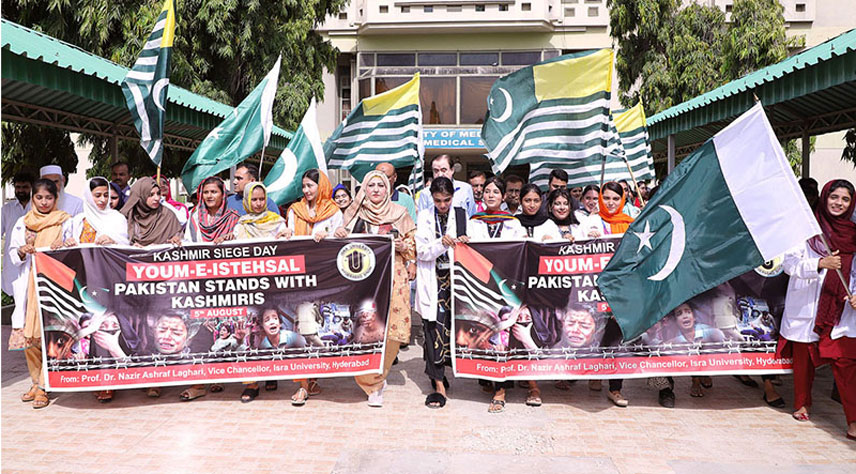Six Years On: Remembering the Revocation of Kashmir’s Special Status
LAHORE – August 5, 2025, marks six years since the Indian government, under Prime Minister Narendra Modi, revoked Article 370 and 35A of its constitution, effectively ending the special constitutional status of Jammu and Kashmir. In response, Pakistan observed the day as “Youm-e-Istehsal” (Day of Exploitation), with nationwide rallies, seminars, and protests expressing solidarity with Kashmiris and condemning what it calls India’s “illegal and oppressive occupation.”
On August 5, 2019, the Indian government unilaterally revoked the autonomy of Jammu and Kashmir, stripping the region of its limited self-governance and bringing it directly under federal control. The move triggered a military lockdown, communications blackout, and widespread detentions in the region, which remains one of the most militarized zones in the world.
Protests and Rallies Across Pakistan
Pakistan marked the anniversary with demonstrations in major cities, including Islamabad, Lahore, Karachi, and Peshawar. In the capital, a solidarity rally organized by the Ministry of Foreign Affairs began at the ministry’s headquarters and marched toward D-Chowk, a central protest hub.
Participants included government officials, civil society members, students, and citizens, all holding placards and chanting slogans in support of Kashmir’s right to self-determination. The rally concluded with a one-minute silence to honor Kashmiri martyrs who lost their lives during the struggle for autonomy.
In parallel, seminars and public forums were held to raise awareness about the ongoing situation in Indian-administered Kashmir, focusing on alleged violations of international human rights and UN resolutions.
Hurriyat Conference Calls for Global Awareness
The All Parties Hurriyat Conference (APHC), a coalition of pro-freedom political groups in Kashmir, called for a global “Black Day” on August 5 to denounce the Indian government’s actions.
In a statement, the APHC emphasized that Kashmiris continue to resist what it calls India’s “forcible annexation” and “constitutional tyranny.” The group urged the international community to recognize the “unabated oppression” and take meaningful steps to facilitate a peaceful resolution in accordance with the UN Security Council resolutions on Kashmir.
Reported Human Rights Violations and Demographic Changes
According to a recent report by the Kashmir Media Service, since the revocation of Article 370:
-
Over 21,000 Kashmiris have been arbitrarily detained, many under the Public Safety Act and Unlawful Activities (Prevention) Act, which allow for detention without trial.
-
More than 1,100 homes and properties have allegedly been razed or set on fire.
-
56,000 acres of land have reportedly been allocated to the Indian military for establishing camps and installations.
Additionally, the Indian government has introduced new domicile laws allowing non-Kashmiris to obtain residency rights. Critics say this has enabled the settlement of over five million Hindus in the region, aiming to dilute its Muslim-majority character—a move seen as part of a broader demographic shift.
Redrawing of Electoral Boundaries
In a controversial development, the Modi government also redrew electoral constituencies in Jammu and Kashmir. The number of assembly seats increased from 83 to 90, but Muslim-majority areas received only a marginal 1% increase in representation. Analysts argue this move is designed to marginalize Muslim political influence and consolidate Hindu-majority control over the legislative process.
Legal and International Concerns
Legal experts and human rights organizations have raised concerns over the constitutionality and legality of India’s actions in Kashmir. Critics argue that:
-
The revocation of Article 370 was carried out without the consent of the Jammu and Kashmir Legislative Assembly, which was dissolved at the time.
-
These actions violate the Fourth Geneva Convention, particularly Article 49, which prohibits an occupying power from transferring its own civilian population into the territory it occupies.
-
India’s steps contradict several UN resolutions that call for a plebiscite to allow Kashmiris to decide their political future.
Despite repeated calls from Pakistan and various human rights groups, international response has remained muted, with major powers largely maintaining a neutral stance, often citing Kashmir as a bilateral issue between India and Pakistan.
Pakistan’s Continued Stance
Pakistan has consistently rejected India’s revocation of Article 370 as unilateral and illegal, emphasizing that Kashmir remains an internationally recognized disputed territory. Islamabad continues to call for international mediation, a UN-supervised plebiscite, and the restoration of Kashmir’s pre-2019 status.
Pakistan’s leadership, including President and Prime Minister, issued strong statements on August 5, reaffirming their moral, political, and diplomatic support for the Kashmiri people.
Conclusion
As six years pass since India revoked Jammu and Kashmir’s autonomy, Pakistan’s observance of Youm-e-Istehsal reflects ongoing tensions and unresolved grievances surrounding the Kashmir dispute. While the region remains locked in political uncertainty, the human cost continues to mount, with thousands still living under fear, displacement, and limited freedom.
Without renewed international focus and constructive dialogue, a just and lasting resolution to the Kashmir conflict remains elusive.















